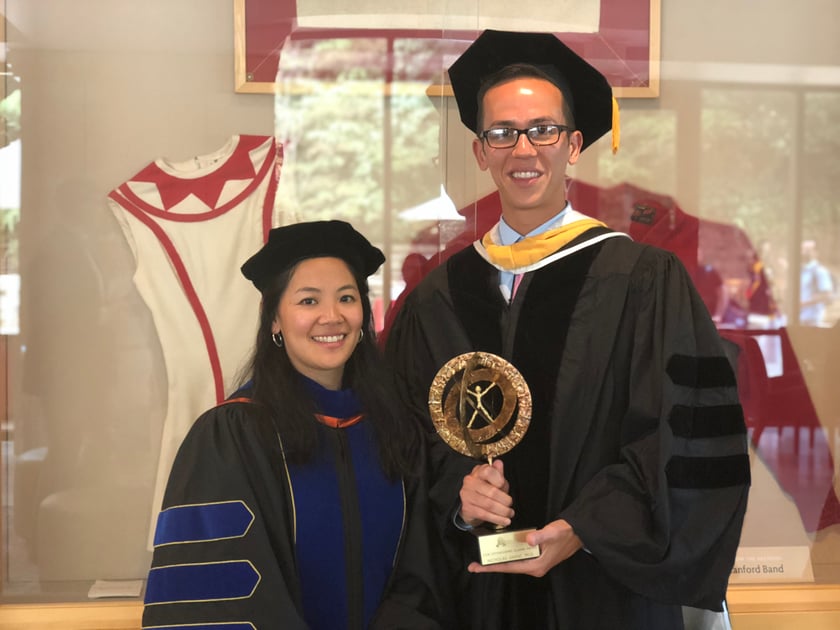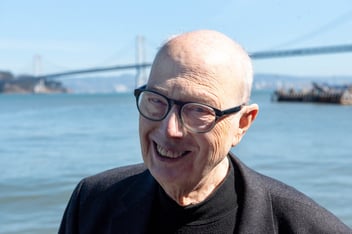
Build Your Own Adventure
Aumni Nick Grant reflects on finding his own path – and linking clinical psychology with community impact
Dr. Nick Grant is a double board-certified clinical psychologist currently serving on active duty in the United States Navy. He is currently assigned as a clinical psychology subject matter expert to the Defense Health Agency Psychological Health Center of Excellence. He previously completed tours at Naval Medical Center San Diego and Naval Surface Group Middle Pacific, with deployments onboard the USS Abraham Lincoln aircraft carrier and the USNS Mercy hospital ship. Nick is a 2015 alumnus of the PhD in Clinical Psychology program. In 2021, he became the first psychologist to be elected president of GLMA. He has been recognized with an APA Citizen Psychologist Presidential Citation for his LGBTQ advocacy, was named a 2021 APA Fellow for Division 44, and received the PAU Distinguished Alumni Award in 2018. He currently serves as one of the inaugural members of PAU’s alumni advisory council.
Can you tell us a little bit about what brought you to PAU?
I was a first-generation college student. I had no idea what I was doing, but I knew that I felt safe in school – and it was always “easy-ish” for me. I had graduated from high school early, went to community college, went to undergrad, got a Master’s – then I decided to pursue a doctorate. I very specifically wanted to go for psychology, but I knew that I wanted to be somewhere where I could do LGBTQ research and community engagement. Ultimately, I came to PAU because of Dr. Goldblum – PAU was at the top of my list because of him.
You were a student at PAU from 2008 to 2015. What changed at PAU in that time?
There were a few logistical changes in that time. I think that part of my first year, we were at the old old campus. The opening of the Allen Calvin campus – the “move to the treehouse” – happened. There was also the name change to Palo Alto University from PGSP, and also, while I was there the undergrad program started.
When I think about it experientially, I think about Liz Hill in Student Affairs - she was the “mom” of the school, the person who was there for the students. PAU in general is a very student-centered educational organization, and Liz was the one who personified that for me. She made sure everyone was taken care of, ran social things, kept people individually connected. As the school expanded, it never felt like it lost any of that – it really focused on students having a good experience, as well as quality.
What’s your strongest memory of PAU from that time? Is there any particular day or event that stands out?
Defending my dissertation. Being a first generation college student, I remember not really knowing if I could do it. After I passed, I remember going to my friend’s house and celebrating. My friends were all there. While I was there I laid down in my friend’s guest room with my shoes on and slept for 12 hours. It was very pivotal!
I have another memory from after I graduated – at APA, I attended a mobile museum called “I Am Psyched!” that was an exhibit of women of color who were leaders in psychology. I’d thought the PAU community would be interested – they ended up doing it, and held a community event on the peninsula with the exhibit and speakers. I got to come, because I was a recipient of one of the alumni awards that year! It was a cool event, and a good example of PAU bringing psychology into the community. It really highlighted the university’s values.
Can you share how PAU influenced what you did next?
I credit a lot of where I’m at to Dr. Goldblum’s mentorship. His saying that I have quoted many times is that “being an LGBTQ psychologist means you wear many hats, you wear your research hat, your clinician hat, and your advocacy hat.” I understand that more fully in reflection. In that sentiment and in his teaching, he really showed me – taught me – what the possibilities of being a psychologist outside of being a clinician and researcher can be, the impact you can have on your community.
Because of that, I have leaned into more opportunities that I don’t think I ever would have taken on. Some those include – joining the Navy at the age of 34. But I also pursued opportunities like applying to a national LGBTQ health nonprofit board and then becoming the first psychology president of that board. Or any of the other community or leadership opportunities I’ve had - within APA, within the Navy, in the LGBTQ space. I think that the lessons that I learned from Dr. Goldblum were really about doing the work as a psychologist to make an impact to help people and communities.
Do you have any advice for PAU graduates?
My advice for anyone is to focus on doing the basics well, and then all of the innovation and creativity and opportunity and community development – all of that then comes so much more easily. We rush through the basics to get to the “good part.” But if we do the basics of psychology well, everything else comes easier.
What do you think PAU’s legacy is - and what would you like to see in the future?
The community is what comes up to me so much when thinking about the legacy piece - Engaging Minds, Improving Lives - I always really liked that! I am not someone who typically wears school sweatshirts, but I really liked that one. I think the school really lived up to the motto. It provides a challenging academic experience, with a focus on how to apply your skills and education to improve the lives of people and communities. PAU brings in excellent faculty who then help students grasp the basics while you “build your own adventure.”
In the future, I think it would be really cool to know more about each of the focal areas of the faculty - what is the ten-year outlook? What are they hoping for in their concentration area? How does the school expand as psychology and humanity continue to grow? PAU has always been an early adopter. I am also excited about the future of alumni engagement – there has been a significant uptick in opportunities and outreach since Chloe joined, including the creation of new avenues for connection. In the future, I’d love to see more work to connect alumni to current students.
I want to add that, as someone who graduated right before Maureen started as president, and then still stayed somewhat engaged, I have been such a fan of Maureen and everything she has done for the university. She is so authentic. She demonstrates her care through both her words and actions. I can’t put metrics to it, but I think it is a massive part of what PAU has been for the last nine years. She’s so intentionally looking toward how to make sure the university continues to innovate and grow. I’m excited about the university, because I know she set it up to continue moving in a positive direction.




